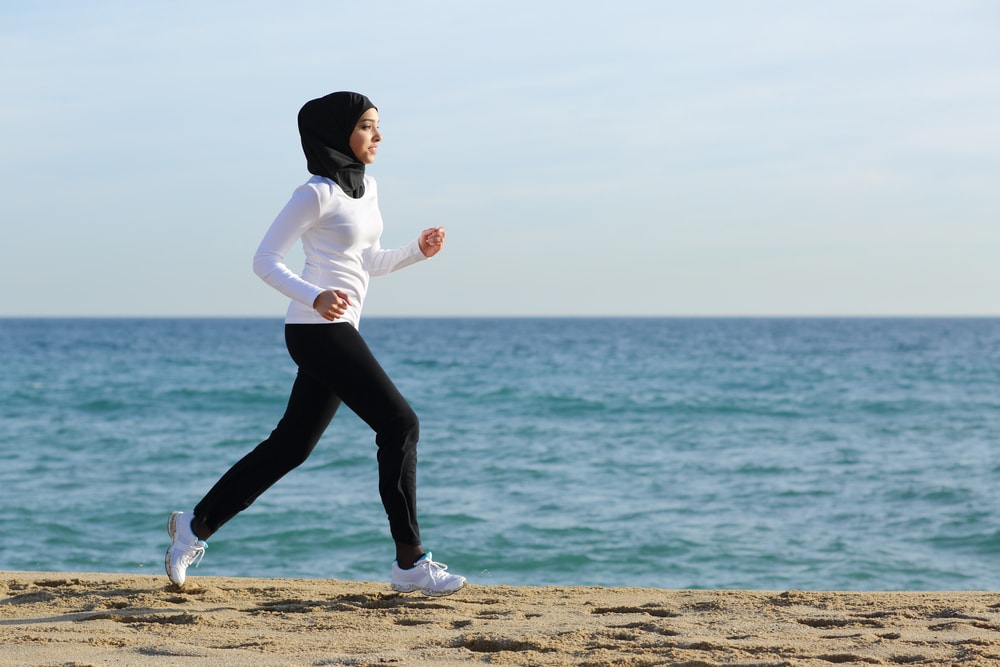It is hard to maintain a normal exercise routine during the holy month of Ramazan due to lower liquid intake and interrupted sleeping patterns.
But finding the time to work out or do some exercise not only boosts your metabolism but also makes you feel good and healthy.
Adil Baksh, a fitness trainer at Ultimate Performance Dubai, said: “The 30-day period of fasting can be challenging, and it can be tempting to abandon fitness and health goals."
“Going long hours without food or water can put a large amount of stress on your body, but with some careful planning and smart training advice, you can still lose weight or build muscle during Ramazan safely and effectively.”
Here are some key points to keep in mind regarding working out in Ramazan.
Which kind of workout is best?
According to Baksh: “When working out during Ramazan, the secret is to stimulate, not annihilate. It’s important to take a more measured approach to your training while fasting."
Another trainer claims he follows the fast personally and bases each session on three fundamental principles: strength training, cardio, and flexibility.
He further said: “The reason I prioritise muscular strength is because a loss of muscle mass will slow down metabolism. The goal should be to avoid both, losing muscle and a drop in your metabolic rate.”
According to him: “When it comes to cardio, I recommend a light-intensity session, limited to 30 minutes of slow, steady distance, every other day. Remember, you will be dehydrated, so your body will use your fat storage as a source of energy, especially if you do cardio before iftar. However, the fact that you’re depleted means your blood pressure might drop at the onset or even after, so don’t skip the warm-up and cool-down routines.”
“Similarly, when you start your resistance training, choose exercises that target the upper body before the lower body to avoid any drop in your blood pressure during or after. The last fitness aspect to focus on is flexibility to avoid any mobility-related issues you might face, especially when you exercise normally again after Ramadan and the Eid break.”
Best time for exercise/workout:
You can damage your health by overworking yourself, especially with the midday sun and no drinks from dawn to dusk.
Exercises involving heavy weights and intense cardio are not advised during a fast. Throughout the holy month, you should also reduce your exercise routine to two cardio workouts per week.
According to Adil Baksh, exercise must be done in the early morning however if doesn’t work then it should be done after Iftar.
“Training early in the morning is best during Ramazan after your first meal of the day,” he says. “If this doesn’t work with your schedule, then hit the gym after your first main meal after iftar, so your body is well fuelled and has the right nutrients for optimal recovery.”
Exercise during a fast is not a simple task, but it is crucial to choose the ideal time to make sure that the routine is secure and long-lasting, says clinical nutritionist Dr. Mona Mubarak.
She also said, “I would suggest doing strength training routines pre-iftar, but if you prefer to exercise after iftar, try to keep your meal light and save your biggest meal for after your session so you don't feel uncomfortable when training.”
To reduce the amount of stress on the body, Mubarak also advises shortening regular workouts by fifteen minutes. Hence, instead of working out for 60 minutes as you typically do, set a time restriction of 45 minutes.
“Don’t feel you have to spend hours in the gym for an effective workout session,” Baksh adds. “You can get a lot done in 45 minutes if you train hard and with intensity. If your long-term goal is building muscle, an option during Ramadan could be to lower the load and add more sets to maintain muscle mass.”
90 minutes before sunset:
You may quickly refresh yourself with water and enjoy the advantages of exercising on an empty stomach by engaging in a short workout during the cooler parts of the day. Any exercise done now, though, needs to be gentle, with lots of stretching, modest weights and repetitions, and increased resistance training. This is also an excellent time for a quick, brisk walk or a little jog.
After your evening meal:
An hour after iftar is a decent time for weight training, even if cardio might be challenging on a full stomach. A little additional food should be consumed to fuel your body on the days you want to exercise following your meal and make sure you drink lots of water to rehydrate.
Between 11pm and 2am:
For those who prefer to work out at night, the ideal time to work out might be between the hours of 11pm and 2am, once your body has had time to completely rehydrate and your meal has had time to settle. Exercise during this time of day might be beneficial if you can get some sleep in the afternoon. It is cooler than during the day and will still provide you with a few hours of sleep before you have to wake up and start the day.
Between 3am and 4am:
If you're an early riser, working exercise could be best done before your morning suhoor. In this manner, you will be on an empty stomach yet still have energy from the meal the night before. You may refuel by eating again after your workout to recover the lost fluids. You'll feel energized for the rest of the day with this strategy.


























